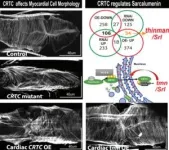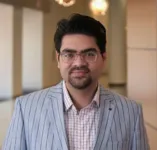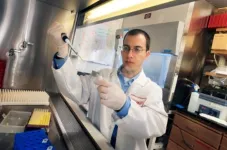(Press-News.org) When an individual visits their doctor, they aren’t supposed to keep secrets. Unless patients are forthcoming about their symptoms, behaviors, and health-related beliefs, it’s hard for healthcare professionals to effectively diagnose and treat illnesses—or to advise and educate patients about how to take better care of themselves in the future.
There’s only one problem: new research from Stevens Institute of Technology shows that many people believe they may be judged if they share mistaken beliefs with their care team—and that doctors really do take strongly negative views of patients who disclose incorrect or unreasonable beliefs.
“People worry about their doctors looking down on them—and it turns out that’s an entirely rational concern,” says Dr. Samantha Kleinberg, the lead researcher on the project. “Our study suggests that doctors really do judge patients harshly if they share information or beliefs that they disagree with.”
To understand how people think about sharing information with healthcare professionals, Dr. Kleinberg and her collaborators surveyed over 350 patients and over 200 physicians, asking how they would view people who held a range of different medical beliefs. Beliefs ranged from true information to incorrect statements of many types: some were reasonable (like believing that eating sugar causes diabetes); some were unreasonable (like believing that carrot juice cures diabetes); and some were conspiracy theories (like believing that pharmaceutical companies deliberately cause diabetes to create more customers for insulin). Dr. Onur Asan, also at Stevens Institute of Technology, co-authored the study along with Dr. Jessecae K. Marsh, a collaborator from Lehigh University.
“The degree to which healthcare professionals held negative perceptions towards patients espousing misinformation surprised us, and suggests doctors may need additional support and resources to effectively treat such patients,” says Dr. Asan.
The more unreasonable a person’s health beliefs, the more negatively they were viewed by both laypeople and healthcare professionals. “We found that our subjects viewed people negatively if they held mistaken beliefs—but viewed them much more negatively if they held more unreasonable or conspiratorial beliefs,” Dr. Kleinberg says.
Surprisingly, however, there was little difference between the responses of doctors and laypeople or patients with personal experience. Even patients living with chronic health conditions, who were familiar with the complexities of healthcare, were highly intolerant of people who held mistaken beliefs, the team found. “We’d thought people who had diabetes themselves might be more sympathetic, but it wasn’t the case at all,” Dr. Kleinberg says.
Physicians were also highly likely to view people negatively when they expressed mistaken beliefs about health-related topics. “That was a surprising result, and frankly a depressing one,” Dr. Kleinberg says. “Laypeople aren’t expected to have medical expertise, so doctors often have to correct mistaken beliefs on health issues. That shouldn’t be something that leads doctors to view patients more negatively.”
Surveys show that the majority of people hold at least some incorrect health-related beliefs, such as the false belief that taking vitamin C will cure their cold, or that eating a sugary snack can directly cause diabetes, making it all the more important that people feel free to solicit expert opinions. “We rely on our doctors to educate us and help us overcome these medical misconceptions—but that’s only possible if we’re able to express our ideas freely, without fear of being judged when we get things wrong,” Dr. Kleinberg says.
Part of the problem is that it isn’t usually possible for laypeople to know whether their own beliefs are correct or incorrect, or whether they will be perceived as reasonable or unreasonable. That means patients are likely to withhold even true and reasonable beliefs in order to minimize the risk of being viewed negatively by their doctor.
More research is needed to explore the ways in which these negative perceptions impact real-world patient-doctor interactions, Dr. Kleinberg says. Still, she adds, it’s clear that physicians need to be doing more to make their patients feel safe and comfortable during routine interactions.
“If we want to have clear communication between patients and healthcare professionals, we need to change the way that doctors think about patients who are misinformed,” Dr. Kleinberg says. “Doctors need to overcome their tendency to judge patients, and actively encourage patients to share their thoughts—even their incorrect ones—much more freely than they currently do.”
About Stevens Institute of Technology
Stevens Institute of Technology is a premier, private research university situated in Hoboken, New Jersey. Since our founding in 1870, technological innovation has been the hallmark of Stevens’ education and research. Within the university’s three schools and one college, 8,000 undergraduate and graduate students collaborate closely with faculty in an interdisciplinary, student-centric, entrepreneurial environment. Academic and research programs spanning business, computing, engineering, the arts and other disciplines actively advance the frontiers of science and leverage technology to confront our most pressing global challenges. The university continues to be consistently ranked among the nation’s leaders in career services, post-graduation salaries of alumni and return on tuition investment.
END
Feeling judged by your doctor? You might be right
Patients who share inaccurate beliefs with their medical team are viewed more harshly by those healthcare professionals, Stevens study shows
2024-08-02
ELSE PRESS RELEASES FROM THIS DATE:
nTIDE July 2024 Jobs Report: People with disabilities hold steady in labor market despite federal reserve's attempts to slow economy
2024-08-02
East Hanover, NJ – August 2, 2024 – Following significant gains since the post-pandemic lockdown, employment rates for people with disabilities have plateaued, remaining near historic high levels over the past year despite the Federal Reserve’s efforts to slow the economy, according to today’s National Trends in Disability Employment – semi-monthly update (nTIDE) issued by Kessler Foundation and the University of New Hampshire’s Institute on Disability (UNH-IOD).
Year-to-Year nTIDE Numbers (comparing July 2023 to July 2024)
Based on data from the U.S. Bureau of Labor Statistics ...
Dopamine physiology in the brain unveiled through cutting-edge brain engineering!
2024-08-02
□ DGIST (President Lee Kunwoo) Department of Brain Sciences Professor Lee Kwang and his team have discovered a new correlation between neural signaling in the brain and dopamine signaling in the striatum. The human brain requires fast neural signal processing in a short period of less than a second. Dopamine is known to have the strongest effect on brain neural signals, but the research team’s newly developed “optical neural chip-based multiple brain signal monitoring technology” shows that changes in dopamine signals within the physiological range do not affect brain neural signal ...
Precise package delivery in cells? Successful observation of endosome behavior provides new clues for disease treatment
2024-08-02
□ A team led by Professor Seo Dae-ha of the Department of Physics and Chemistry at DGIST (President Lee Kun-woo) has developed new real-time microscopy technology and successfully observed the behavior of “motor proteins”[1], which may hold the key to unraveling the efficient material transport strategy of cells. The research team used nanoparticle probe, high-resolution microscopy, and Fourier transform algorithm technologies to develop “Fourier transform-based plasmonic dark-field microscopy” (FT-pdf microscopy) with positional and angular accuracy comparable to electron microscopy, achieving the highest level of existing ...
Sustainable green energy innovation! Development of new technology for energy device that heals itself from damage incurred while generating electricity
2024-08-02
□ A team led by Professor Lee Joo-hyuk of the Department of Energy Engineering at DGIST (President Lee Kunwoo) has developed an ionic polyurethane-based triboelectric generator[1]with self-healing, biodegradable[2], and high electro-positive properties. The device has been designed as a green energy device that can minimize the impact on the environment by facilitating self-healing and biodegradability, while significantly enhancing power output performance through the use of ionic liquid. Based on these properties, it is expected to be used as a sustainable power source in next-generation soft electronic devices and wearable devices.
- ...
White Matter May Aid Recovery From Spinal Cord Injuries: Study
2024-08-02
Injuries, infection and inflammatory diseases that damage the spinal cord can lead to intractable pain and disability. Some degree of recovery may be possible. The question is, how best to stimulate the regrowth and healing of damaged nerves.
At the Vanderbilt University Institute of Imaging Science (VUIIS), scientists are focusing on a previously understudied part of the brain and spinal cord — white matter. Their discoveries could lead to treatments that restore nerve activity through the targeted delivery of electromagnetic stimuli or drugs.
As in the brain, the spinal cord is made up nerve cell bodies (gray matter), which process sensation and control voluntary movement, and ...
Reduction in folate intake linked to healthier aging in animal models
2024-08-02
August 1, 2024 - by Ashley Vargo - In a study published in Life Science Alliance, Texas A&M AgriLife Research scientists found that decreasing folate intake can support healthier metabolisms in aging animal models, challenging the conventional belief that high folate consumption universally benefits health.
The study was led by Michael Polymenis, Ph.D., professor and associate head of graduate programs in the Texas A&M College of Agriculture and Life Sciences Department of Biochemistry and Biophysics.
Michael Polymenis, Ph.D., principal investigator, ...
How America’s elites may hold the key to lowering murder rates
2024-08-02
COLUMBUS, Ohio – New crime laws, police funding and similar efforts may have some effect on homicide rates in the United States – but the biggest impact will come from the actions of our political and economic elites.
That’s the conclusion of historian Randolph Roth, author of the 2009 book American Homicide, in a new report he wrote for the Harry Frank Guggenheim Foundation.
Roth, who is a professor of history at The Ohio State University, provides evidence that homicide rates are linked to how citizens feel about the legitimacy of government and their sense of connectedness ...
NSF awards new funding to bolster UVA research computing project
2024-08-02
The National Science Foundation is awarding a new grant to support the Virginia Assuring Controls Compliance of Research Data project, known as ACCORD, a program that has helped students and faculty at universities across Virginia gain access to critical research computing resources.
The ACCORD program has provided a platform for researchers to securely share and store data as well as take on projects that require the protection of sensitive data. Participants have included minority-serving institutions, those that do not grant Ph.D. degrees, and others that lack this computing infrastructure.
Neal Magee, an associate professor with the University of Virginia’s ...
FDA approves engineered cell therapy for treating rare sarcoma
2024-08-02
The U.S. Food and Drug Administration (FDA) has granted accelerated approval for the immunotherapy afamitresgene autoleuecel (Tecelra®, also known as afami-cel) for the treatment of adults with a rare soft tissue cancer called synovial sarcoma.
Afami-cel is the first engineered T cell therapy to receive FDA approval for a solid tumor cancer.
The clinical trial that resulted in the drug’s approval was led by Memorial Sloan Kettering Cancer Center (MSK) sarcoma specialist and immunotherapy expert Sandra D’Angelo, MD.
“This treatment offers an important new option for people with this rare cancer,” Dr. D’Angelo ...
Emory researchers help discover source of deadly fungal infections in bone marrow transplant patients, new study finds
2024-08-02
Emory researcher David Weiss has spent years studying a baffling phenomenon called heteroresistance, in which a tiny fraction of bacteria remain resistant to antibiotics, while the remainder succumb. Recently, he brought his scientific acumen to the equally deadly threat of fungal bloodstream infections in patients receiving bone marrow transplants. Bloodstream infections can be lethal in these patients, including infections from Candida parapsilosis, a species of fungi that can live in the digestive tract and occasionally make it into the bloodstream.
Weiss partnered ...
LAST 30 PRESS RELEASES:
Children with poor oral health more often develop cardiovascular disease as adults
GLP-1 drugs associated with reduced need for emergency care for migraine
New knowledge on heritability paves the way for better treatment of people with chronic inflammatory bowel disease
Under the Lens: Microbiologists Nicola Holden and Gil Domingue weigh in on the raw milk debate
Science reveals why you can’t resist a snack – even when you’re full
Kidney cancer study finds belzutifan plus pembrolizumab post-surgery helps patients at high risk for relapse stay cancer-free longer
Alkali cation effects in electrochemical carbon dioxide reduction
Test platforms for charging wireless cars now fit on a bench
$3 million NIH grant funds national study of Medicare Advantage’s benefit expansion into social supports
Amplified Sciences achieves CAP accreditation for cutting-edge diagnostic lab
Fred Hutch announces 12 recipients of the annual Harold M. Weintraub Graduate Student Award
Native forest litter helps rebuild soil life in post-mining landscapes
Mountain soils in arid regions may emit more greenhouse gas as climate shifts, new study finds
Pairing biochar with other soil amendments could unlock stronger gains in soil health
Why do we get a skip in our step when we’re happy? Thank dopamine
UC Irvine scientists uncover cellular mechanism behind muscle repair
Platform to map living brain noninvasively takes next big step
Stress-testing the Cascadia Subduction Zone reveals variability that could impact how earthquakes spread
We may be underestimating the true carbon cost of northern wildfires
Blood test predicts which bladder cancer patients may safely skip surgery
Kennesaw State's Vijay Anand honored as National Academy of Inventors Senior Member
Recovery from whaling reveals the role of age in Humpback reproduction
Can the canny tick help prevent disease like MS and cancer?
Newcomer children show lower rates of emergency department use for non‑urgent conditions, study finds
Cognitive and neuropsychiatric function in former American football players
From trash to climate tech: rubber gloves find new life as carbon capturers materials
A step towards needed treatments for hantaviruses in new molecular map
Boys are more motivated, while girls are more compassionate?
Study identifies opposing roles for IL6 and IL6R in long-term mortality
AI accurately spots medical disorder from privacy-conscious hand images
[Press-News.org] Feeling judged by your doctor? You might be rightPatients who share inaccurate beliefs with their medical team are viewed more harshly by those healthcare professionals, Stevens study shows




